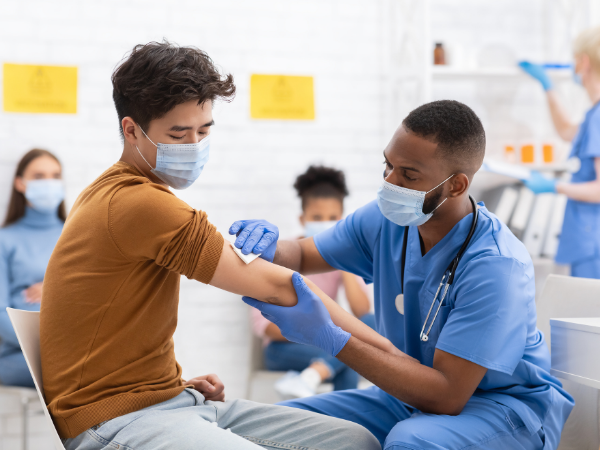COVID-19 Vaccine Research Update
People living with inflammatory arthritis need at least two doses of the Moderna COVID-19 vaccine, according to new research results out of Arthritis Research Canada in Quebec.
Researchers measured the development of anti-COVID-19 spike antibodies after first and second doses of the vaccine in rheumatoid arthritis and lupus patients. They discovered that, after the first dose, the response was around 60 per cent. After the second dose, that number increased to 80 per cent.
“It is worthwhile for patients living with inflammatory arthritis to receive at least two doses of the Moderna vaccine and maybe even more,” said Dr. Paul Fortin, a senior scientist at Arthritis Research Canada who developed the study in collaboration with research scientist, Dr. Inés Colmegna.
No Flare Risk

In addition to production of anti-COVID-19 spike antibodies (i.e. immunogenicity), arthritis patients expressed concerns that receiving the vaccine could result in a flare of disease activity characterized by increased inflammation and pain.
“We didn’t see any disease flare ups,” Fortin said. “Participants with rheumatoid arthritis reported more joint pain than the control group, but this was also true before they received the vaccine.”
Fortin added that these results are reassuring but it needs to be considered that the study is small. It included 162 people with rheumatic disease and 58 controls. He cautioned that there could still be rare effects not captured in the sample group.
Researchers also examined whether age impacted a person’s ability to develop antibodies and didn’t see a difference in the frequency of individuals older and younger than 65 who were positive for anti-COVID-19 spike antibodies.
More Research Needed
Patients using rituximab or B-cell-depleting therapy, as well as individuals with lupus on mycophenolate mofetil (MMF) treatments showed a significantly lower response to the Moderna vaccine in terms of developing antibodies.
“These results will likely generate some anxiety,” Fortin said. “Everyone should continue to follow public health recommendations to stay safe regardless of having or not having antibodies.”
It is important to note that B-cell-depleting therapies are administered every six months, so the research team was unable to coordinate when the vaccine was given in relation to the treatment. This research could help inform guidelines for how to vaccinate these people. The team has also applied for further funding to study a larger number of patients on rituximab. Lupus patients on MMF need to be further studied as well.
Fortin explained that, so far, the study only examined the development of antibodies. But there is another arm of the immune system called cellular immunity. This involves cells reacting against the virus. Researchers are studying the cellular response and will be analyzing results soon.
Stay Tuned
When COVID-19 vaccines started rolling out, people living with inflammatory arthritis expressed concerns over their safety and efficacy. No clinical studies looked at patients with autoimmune rheumatic diseases, so initial vaccine guidelines were conservative.
Drs. Fortin and Colmegna joined forces to find answers for people living with arthritis with funding from the Government of Quebec.
“The results should be reassuring for people living with rheumatic disease,” Fortin said. “However, what we don’t yet know is the duration of the effect of the vaccine on these patients. Will they have antibodies after 12 months? Will the antibody levels be the same as in the general population?”
Six months after receiving their COVID-19 vaccines, participants answered further questions and provided blood samples. Researchers are currently analyzing those samples to determine whether the response to the vaccine is sustained. In September 2021, Quebec’s Ministry of Health started offering third doses to immunosuppressed patients. The study has been adapted to measure the impact of this third dose.




















































